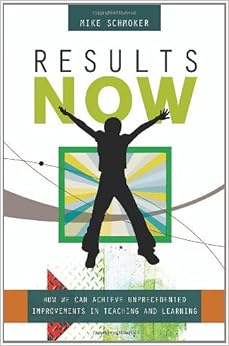I've been reading Mike Schmoker's Results Now the past few days. It's been a great reminder for the start of this year about the urgent, important work that classroom teachers undertake daily and also a reality check that the smallest changes can bring about big results. And when I say "smallest changes," I really do mean that. He doesn't argue for anything radical in this book, unless you consider making sure success criteria is clear to students by showing strong examples of what they ultimately are expected to do, giving descriptive and specific feedback, or having kids actually read and write in school.
 Throughout the book, Schmoker calls for a "coherent curriculum" and the opening of our classrooms to scrutiny and feedback. It's this quote that really has had me thinking for days:
Throughout the book, Schmoker calls for a "coherent curriculum" and the opening of our classrooms to scrutiny and feedback. It's this quote that really has had me thinking for days:
'To put the need in perspective: we would be properly outraged if administrators routinely failed to show up for appointments with parents, or if most teachers frequently arrived at class 10 or 15 minutes late. But we tolerate practices that are at least as irrational--and egregious--when we fail to monitor or ensure effective instruction or a coherent curriculum that includes plenty of purposeful reading, writing, and critical thinking. ... We don't tolerate doctors who fail to wash their hands before surgery. It is time for the education professions to develop a healthy amount of what Roland Barth calls "moral outrage at ineffective practices" (2002, p. 10)' (137)
I'm the type of person that tries to avoid conflict with anyone. I'd much rather pose questions rather than point out flaws. But at the same time, don't I have an obligation -- as do my colleagues to me -- to point out things that really are an injustice to students in classroom practice?
Our students get one chance at a free education. One. I know that teaching practice, much like medicine, really is a system of trials and errors. But there are things that we fundamentally know are not okay. And if we wouldn't be okay with a doctor not washing his hands, then why do we sometimes make excuses for others?
 Throughout the book, Schmoker calls for a "coherent curriculum" and the opening of our classrooms to scrutiny and feedback. It's this quote that really has had me thinking for days:
Throughout the book, Schmoker calls for a "coherent curriculum" and the opening of our classrooms to scrutiny and feedback. It's this quote that really has had me thinking for days:'To put the need in perspective: we would be properly outraged if administrators routinely failed to show up for appointments with parents, or if most teachers frequently arrived at class 10 or 15 minutes late. But we tolerate practices that are at least as irrational--and egregious--when we fail to monitor or ensure effective instruction or a coherent curriculum that includes plenty of purposeful reading, writing, and critical thinking. ... We don't tolerate doctors who fail to wash their hands before surgery. It is time for the education professions to develop a healthy amount of what Roland Barth calls "moral outrage at ineffective practices" (2002, p. 10)' (137)
I'm the type of person that tries to avoid conflict with anyone. I'd much rather pose questions rather than point out flaws. But at the same time, don't I have an obligation -- as do my colleagues to me -- to point out things that really are an injustice to students in classroom practice?
Our students get one chance at a free education. One. I know that teaching practice, much like medicine, really is a system of trials and errors. But there are things that we fundamentally know are not okay. And if we wouldn't be okay with a doctor not washing his hands, then why do we sometimes make excuses for others?
Comments
Post a Comment